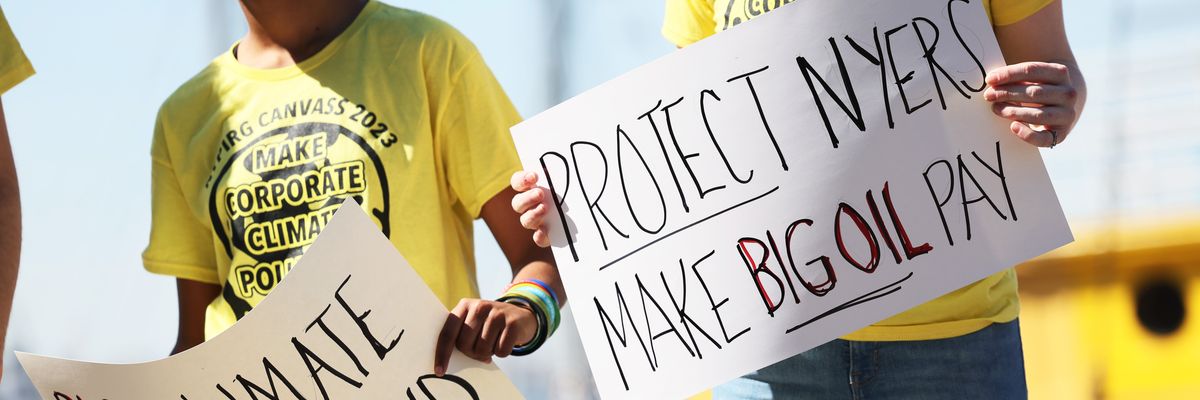Climate advocates in New York on Thursday celebrated a "massive win" for working people, youth, and the climate as Democratic Gov. Kathy Hochul made the state the second to pass a law to make fossil fuel giants financially responsible for the environmental damages they cause.
Hochul signed the Climate Change Superfund Act into law after years of advocacy, delivering what Blair Horner, executive director of the New York Public Interest Research Group (NYPIRG), called "a welcome holiday gift for New York taxpayers."
The law is modeled on the 1980 State and Federal Superfund law, which requires corporations to fund the cleanup of toxic waste that they cause, and will require the largest fossil fuel companies, which are responsible for a majority of carbon emissions since the beginning of this century, to pay about $3 billion per year for 25 years.
The money—which otherwise would have to be paid by taxpayers, many of whom are already suffering from the extreme weather caused by fossil fuel emissions—will be used to restore and safeguard wetlands, upgrade public infrastructure, improve storm water drainage systems, and pay for climate disaster recovery efforts.
The law will "reinvest $75 billion into the communities most impacted by toxic air pollution, record-breaking storms, and dangerous heatwaves," said Theodore Moore, executive director of the Alliance for a Greater New York.
Lee Wasserman, director of the Rockefeller Family Fund, which lobbied for the new law, told The New York Times that "nothing could be fairer than making climate polluters pay."
New York state Sen. Liz Krueger (D-28), who sponsored the legislation, told the Times that repairs from extreme weather disasters and climate adaptation is projected to cost half a trillion dollars in New York by 2050.
"That's over $65,000 per household, and that's on top of the disruption, injury, and death that the climate crisis is causing in every corner of our state," Krueger said.
State Rep. Phara Souffrant Forrest (D-57) said the new law adopts a "they broke it, they bought it" approach for climate disasters and fossil fuel emissions.
New York taxpayers learned in 2024 that they would be funding $2.2 billion in climate-related infrastructure repairs and upgrades, and the U.S. Army Corps of Engineers estimates $52 billion would be needed to protect New York Harbor.
"On top of that, we’ll need $75-100 billion to protect Long Island, and $55 billion for climate costs across the rest of the state," said NYPIRG. "The state comptroller has predicted that more than half of local governments' costs will be attributable to the climate crisis."
Looking at the industry and its $1 trillion in profits over the last four years, one would never know that the emissions of the world's largest polluting corporations have helped rack up $5.4 trillion in climate damages over the last 26 years.
"Our future is on fire, New York is on fire, and meanwhile the fossil fuel industry is bringing in trillions of dollars in profit year after year," said Keanu Arpels-Josiah, organizer for Fridays for Future NYC. "It's high time for them to pay their fair share in New York. The signing of the full Climate Superfund Act, as youth across the state have advocated for year after year, is a critical step toward that—let this be the beginning of a shift on climate from this governor."
NYPIRG emphasized that the costs will not fall back on consumers.
"According to experts, because Big Oil's payments would reflect past contributions to greenhouse gas emissions, oil companies would have to treat their payments as one-time fixed costs," said the group.
New York is the second state to pass a law ensuring big polluters will play for climate damages. Vermont passed a similar law over the summer—a year after a federal emergency was declared across the state after a storm dumped two months' worth of rain in just two days, causing historic and devastating flooding.
Jamie Henn, director of Fossil Free Media, said the Climate Change Superfund Act "kicks open the door for more states to follow."
Similar legislation has been proposed in states including Maryland and New Jersey.
Krueger told The Wall Street Journal earlier this year that she would "prefer this all be done at the federal level," but as author and 350.org co-founder Bill McKibben wrote Thursday, Hochul's signing of the Climate Change Superfund Act answers the question: "How do we proceed with the most important fight in the world, when the most important office in the world is about to be filled by a climate denier, and when there's a Congress with no hope of advancing serious legislation?"
"One important answer is: We go state by state, and city by city, making gains everywhere we still can," said McKibben, less than a month before President-elect Donald Trump's inauguration.
"And now those other states may join in too. The billions begin to add up. This is, more or less, how the states slowly and then quite rapidly took down the tobacco industry," he wrote. "So—many many thanks to the people who but their bodies on the line these past days, and those who have worked so hard for years to get us here. This may be what progress looks like in the Trump years."
